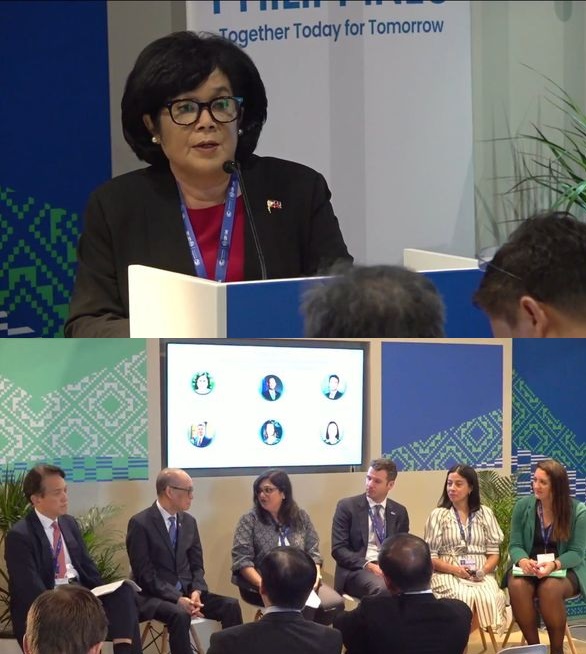
December 05, 2023 Tuesday

Sharm El-Sheikh, 5 December 2023 — Officials from the Government of the Philippines and development partner organizations expressed their support to the National Adaptation Plan (NAP) and Nationally Determined Contribution Implementation Plan (NDCIP)—the country’s action plans on adaptation and mitigation, during a high-level dialogue in the Philippine Pavilion at the 28th Conference of the Parties (COP28) of the UN Framework Convention on Climate Change (UNFCCC) on December 2.
Department of Environment and Natural Resources (DENR) Secretary Maria Antonia Yulo-Loyzaga, who is also the Official Representative of the President to the CCC, explained that both the NAP and NDCIP are “live documents and each will have their own priorities and means of implementation,” adding that “our next step is to carve out a holistic and integrated approach to adaptation, mitigation, and disaster risk reduction, so that strategic investment can produce multiple positive values in the areas that need it the most.”
“Our NAP provides macro-level climate risk and impact assessment of historical and future scenarios; identifies key priority sectors and adaptation strategies; and a roadmap for implementation,” said Commissioner Rachel Anne Herrera of the Climate Change Commission, adding that “inclusivity must follow where the NAP implementation must leave no one behind, fostering collaborative climate actions that will reach up to the last mile.”
DENR Undersecretary Analiza Rebuelta-Teh meanwhile presented on the implementation plan of the NDC, which “serves as a roadmap and contains actions of implementation of the NDC in five sectors: energy, transport, agriculture, industry, and waste” and having an estimated investment cost of PHP3.6 trillion or US$64 billion.
Secretary Renato Solidum, Jr. of the Department of Science and Technology (DOST) expressed his support and underscored the importance of incorporating science into our climate action plans. “We need to integrate science with our resilience strategies. We need everyone to work together. After all, the purpose of science is to serve the needs of the people on our planet. I have high hopes that these adaptation plans and initiatives will turn the tides towards the Philippines’ climate resilience journey for us to become victors over disasters,” he said.
Senate President Pro-Tempore Loren Legarda, UNFCCC NAP Champion, thanked the CCC and DENR for leading the development of the NAP and NDCIP and committed “in making the goals and aspirations contained in our NAP and NDCIP a reality for all.”
Leaders from the government and development sectors shared their insights in the panel discussion on “Partnerships to Support Climate Policy and Investments in the Philippines,” which was moderated by Ms. Naeeda Crishna Morgado, Asian Development Bank (ADB) Climate Change Focal for the Philippines and Southeast Asia.
Secretary Benjamin Diokno of the Department of Finance (DOF) highlighted the critical role of the private sector in supporting the NAP and NDCIP. “The Philippines is basically a private sector economy. Government’s share is about 1/4 of the total economy, so we need a lot of private sector participation in this endeavor. That’s why we revised our public-private partnership framework so that they can invest in areas that are climate-friendly,” Diokno said.
He also underscored that the government must help itself by allocating budget, and tagging to which climate projects and programs they go for impact. “Having a fund does not mean anything by itself, we need to use it to implement,” he noted, based on the lessons from the projects supported by the People’s Survival Fund, which is the country’s adaptation fund.
Ms. Carolina Fuentes, Director of the Green Climate Fund (GCF) Division of Country Programming, meanwhile explained that NAPs and NDCs are key pieces to inform programming. “We have to rely on the NDCs and the NAPs as the guiding documents. Truly, they are charting the way in which the investments of the GCF should go,” she said.
.
Mr. Woochong Um, ADB Managing Director General, also stressed that “[what] we have to do immediately is to convert these plans into investible plans, and investible plans do have projects underneath. We have to put a lot of effort collectively to identify these projects, and design and turn them from concepts into bankable projects.”
Mr. Peter Bentley, Adaptation and Resilience Team Lead of the United Kingdom Foreign, Commonwealth & Development Office (FCDO), said that the top priority for the UK when it comes to supporting vulnerable countries is on adaptation but has been burdened in the past by investments without long-term vision. “These investments, they get undone by not taking a really long-term vision on adaptation, and I think that’s what the Philippines has done really well. That’s what we look forward to in a long-term partnership,” he said.
Ms. Atika Ben Maid, Deputy Head of the Climate and Nature Division of the AFD - Agence Française de Développement, noted that the AFD always checks first a project’s compliance with the country’s NDC or NAP. “When a country like the Philippines is so advanced in terms of launching their NDC and NAP, it’s actually making our life easier. It is important that we ensure that projects are aligned with these strategic documents. The Philippines is one of the countries that we usually use in other panels as an example of a partnership in terms of climate financing and implementation, concretization of not only strategies throughout the first step but practical and real actions on the ground,” she said.
COP28 is held in Dubai, UAE from 30 November to 12 December 2023, where the first Global Stocktake of the Paris Agreement will also take place. For updates on COP28, visit https://www.cop28ph.denr.gov.ph.